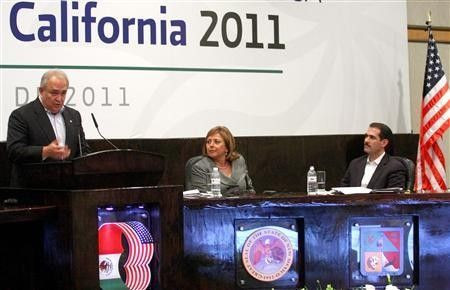U.S.-Mexico Border Governors Sign Crime-Fighting Pact

Governors along the U.S.-Mexico border agreed on Thursday to examine how to create shared databases where they can swap DNA and other biometric information on criminals in an effort to curb the flow of guns and drugs between the two countries.
Officials announced the agreement at the end of an annual conference of regional leaders from both sides of the border that this year failed to attract many chief executives.
New Mexico's Republican governor Susana Martinez was the only U.S. governor in attendance along with three governors, out of the six invited, from the Mexican side. The Texas governor, Republican Presidential hopeful Rick Perry, was not present and his state did not sign the final agreement.
Drug violence has exploded along the border in recent years as the Mexican government, with U.S. support, takes on powerful cartels smuggling narcotics, illegal immigrants and weapons across the nearly 2,000-mile line.
The hope is that every convicted criminal (deported from the United States) will return with biometric information that follows him back into Mexico, said Jose Osuna, governor of Baja California. The data could then be used by Mexican authorities to fight crime, he said.
Mexican President Felipe Calderon says voracious U.S. drug consumers are partly to blame for the spiraling violence, which has killed more than 42,000 people in Mexico during the five years of his term.
He also points to a river of U.S. guns flowing south across the border, including high-powered assault weapons that fuel escalating drug battles.
The U.S. government is still dealing with a scandal around a controversial operation at the Bureau of Alcohol, Tobacco, Firearms and Explosives (ATF), known as Fast and Furious, that allowed weapons to move freely over the border.
Governors at the meeting urged U.S. officials to better track weapon sales and showed their support for U.S. President Barack Obama's latest efforts to curb the weapons trade.
The nearly three-decade-old conference was designed to soothe tensions along the busy dividing line.
But last year, Arizona Republican Governor Jan Brewer canceled the event after her Mexican counterparts protested the state's tough immigration laws. This year the governor pulled out at the last minute, saying through a spokesperson she had to attend to pressing state government business.
© Copyright Thomson Reuters 2024. All rights reserved.





















